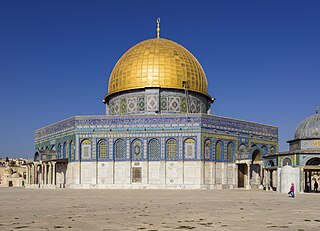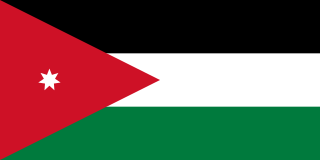Related Research Articles

The Israeli–Palestinian conflict is an ongoing military and political conflict in the Levant. Beginning in the mid-20th century, it is one of the world's longest continuing conflicts. Various attempts have been made to resolve the conflict as part of the Israeli–Palestinian peace process, alongside other efforts to resolve the broader Arab–Israeli conflict. Public declarations of claims to a Jewish homeland in Palestine, including the First Zionist Congress of 1897 and the Balfour Declaration of 1917, created early tensions in the region after waves of Jewish immigration. Following World War I, the Mandate for Palestine included a binding obligation for the "establishment in Palestine of a national home for the Jewish people". Tensions grew into open sectarian conflict between Jews and Arabs. The 1947 United Nations Partition Plan for Palestine was never implemented and provoked the 1947–1949 Palestine War. The current Israeli-Palestinian status quo began following Israeli military occupation of the West Bank and Gaza in the 1967 Six-Day War, known as the Palestinian territories.

The history of the State of Palestine describes the creation and evolution of the State of Palestine in the West Bank and Gaza Strip.

The history of the Israeli–Palestinian conflict traces back to the late 19th century when Zionists sought to establish a homeland for the Jewish people in Ottoman-controlled Palestine. The Balfour Declaration of 1917, issued by the British government, endorsed the idea of a Jewish homeland in Palestine, which led to an influx of Jewish immigrants to the region. Following World War II and the Holocaust, international pressure mounted for the establishment of a Jewish state in Palestine, leading to the creation of Israel in 1948.

The Jordanian annexation of the West Bank formally occurred on 24 April 1950, after the 1948 Arab–Israeli War, during which Transjordan occupied territory previously part of Mandatory Palestine and, excluding Jerusalem, earmarked by the UN General Assembly Resolution 181 of 29 November 1947 for an independent Arab state to be established there alongside a Jewish state mainly to its west. The annexation tripled the population of Transjordan, from 400,000 to 1,300,000.

The Mediterranean Games is a multi-sport event organised by the International Committee of Mediterranean Games (CIJM). It is held every four years among athletes from countries bordering the Mediterranean Sea in Africa, Asia and Europe. The first Mediterranean Games were held in 1951 in Alexandria, Egypt, while the most recent games were held in 2022 in Oran, Algeria.


The culture of the Palestinian people is influenced by the many diverse cultures and religions which have existed in the historical region of Palestine. Their cultural and linguistic heritage is a blend of both Arabic elements and the foreign cultures that have come to rule the land and its people over the course of thousands of years.

Sport in Israel plays an important role in Israeli culture and is supported by the Ministry of Culture and Sport. The most popular sports in Israel have traditionally been Association football (mainly) and basketball (secondly) – with the first being considered the national sport – in both of which Israeli professional teams have been competitive internationally. Israel is an international center for Jewish sport around the world and since 1932 the Maccabiah Games, an Olympic-style event for Jewish athletes, is held in the country. Despite Israel's location in the Asian continent, the Israeli sports associations in various sports belong to the European associations due to the refusal of many Arab Asian countries to compete with Israeli athletes.

The Arab–Israeli conflict is an ongoing intercommunal phenomenon involving political tension, military conflicts, and other disputes between various Arab countries and Israel, which escalated during the 20th century, but had mostly faded out by the early 21st century. The roots of the Arab–Israeli conflict have been attributed to the support by Arab League member countries for the Palestinians, a fellow League member, in the ongoing Israeli–Palestinian conflict; this in turn has been attributed to the simultaneous rise of Zionism and Arab nationalism towards the end of the 19th century, though the two national movements had not clashed until the 1920s.

Israel has competed at the Olympic Games as a nation since 1952. Its National Olympic Committee was formed in 1933, during the British Mandate of Palestine. Israel has sent a team to each Summer Olympic Games since 1952, and to each Winter Olympic Games since 1994. The country became a member of the European Olympic Committees (EOC) in 1994.

Palestine is represented on the International Olympic Committee by the Palestine Olympic Committee, which has sent teams to compete at each Summer Olympics since 1996 under the IOC country code PLE. Palestine has yet to compete at the Winter Olympics, and no athletes from Palestine have ever won an Olympic medal.

The following outline is provided as an overview of and topical guide to the State of Palestine:

The Palestine Olympic Committee is the National Olympic Committee of the State of Palestine. The State of Palestine has been recognized as a member of the Olympic Council of Asia (OCA) since 1986, and the International Olympic Committee (IOC) since 1995.
The sport of football in the country of Palestine is run by the Palestinian Football Association. The association administers the national football team as well as the West Bank Premier League. They are members of FIFA and the Asian Football Confederation. Women's football is popular also in Palestine. The opening match of the Palestine Women's National Football League on February 10, 2011, in the Feisal al-Husseini Stadium was attended by an estimated 8,000 people. The Women's league has six teams. Football is the most popular sport in Palestine. Honey Thaljieh is a pioneer in women's football.
Salim Tamari, is a Palestinian sociologist who is the director of the Institute of Palestine Studies and an adjunct professor at the Center for Contemporary Arab Studies at Georgetown University. Rashid Khalidi, the Edward Said Professor of Modern Arab Studies at Columbia University, has called Tamari "the preeminent Palestinian historical sociologist."

Palestine competed at the 2012 Summer Olympics in London, held from 27 July to 12 August 2012. This was the nation's fifth consecutive appearance at the Summer Games.

The Mandatory Palestine national football team, also known as the Eretz Israel national football team, represented the British Mandate of Palestine in international football competitions, and was managed by the Palestine Football Association.
The Arab Palestine Sport Federation was a governing body of sport activities for Palestinian Arabs in Mandatory Palestine. The federation was active between 1931 and 1937 and between 1944 and 1948. It organized a variant of activities in various sports, mostly in football, boxing, and weightlifting.
References
- ↑ "Olympic Profile: Atlanta 1996;For Palestinian Runner, Carrying Flag Is Glory Enough". The New York Times. 4 April 1996.
- ↑ "Athlete who carries Palestinians' first Olympic hopes to Atlanta". The Independent . July 11, 1996. Retrieved 2009-11-09.
- ↑ Harvey, Randy (30 September 1986). "Israel Denounces Admission of PLO to Asian Olympic Panel". Los Angeles Times.
- ↑ "Palestine Olympic Committee". www.olympic.org: Official Website of the Olympic Movement. Retrieved 2009-07-28.
- ↑ "Israel, Palestine hold 'Sports for Peace' talks". 20 April 2011.
- ↑ "Olympics Features: Rome hosts Israel and Palestine to promote peace through sport". Archived from the original on 2011-09-12. Retrieved 2016-01-10.
- ↑ From Palestine to America: A Memoir – Page 12, Taher Dajani – 2008
- ↑ "About Palestine >> Culture". palestine-australia.com. Embassy of the State of Palestine (The General Delegation of Palestine to Australia, New Zealand and the Pacific). Retrieved October 14, 2023.
The most popular sport in Palestine is football
- ↑ Muslim Women and Sport – Page 183, Tansin Benn, Gertrud Pfister, Haifaa Jawad – 2010
- ↑ A Companion to Sport – Page 260, Ben Carrington – 2013
- ↑ Reading and Writing the Mediterranean – Page 105, Norma Bouchard, Massimo Lollini – 2006
- ↑ Joe Weider, Ben Weider – 2006, Brothers of Iron – Page 279
- ↑ Brooks, Robert (2009). Jerusalem Wall: A Decade of Division and Urban Incarceration. International Peace and Cooperation Center. OCLC 754565645.[ page needed ]
- ↑ "Equestrian club caters to all". www.jmcc.org.
- ↑ Amara, M. (2011-11-24). Sport, Politics and Society in the Arab World. Springer. ISBN 978-0-230-35950-5.
- ↑ "BOXING REACHES PALESTINE; British Soldiers Conduct Bouts in the Holy Land". The New York Times. 27 November 1917. ProQuest 99849255.
